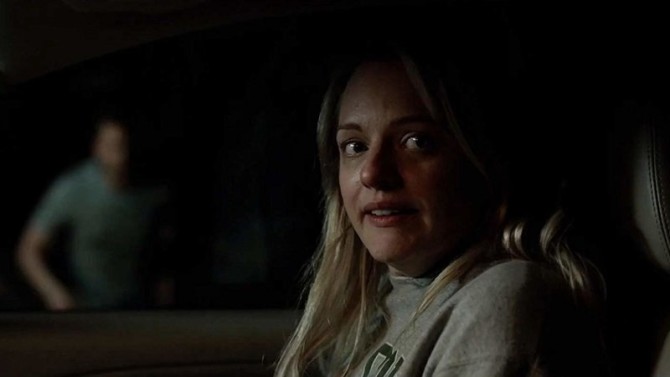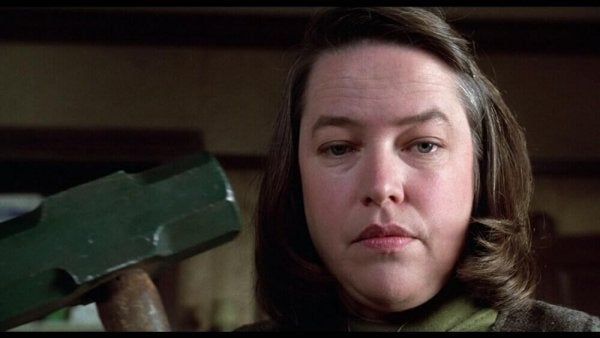Genre: Drama/Comedy
Premise: Life as a single dad hasn’t been a challenge for Las Vegas blackjack dealer Mike Klein, until his ex resurfaces after walking out on the family six years ago.
About: This script finished with 10 votes on last year’s Black List. The Black List hasn’t been holding up its end of the bargain lately. You know, since it isn’t providing us with a list of quality screenplays. Lots of duds lately. Will the losing streak continue? Apropos question since this movie takes place in VEGAS.
Writer: Derek Elliott
Details: 104 pages
Before we get to this script, we need to talk about the logline. Keep in mind that loglines that end up on the Black List are often written by managers or agents who have no experience writing loglines. Those same reps may ask the writer to come up with a logline and since this version of the logline isn’t required to hook potential readers, the writers may treat it more as a generic one-sentence summary as opposed to what a traditional logline should be, which is a marketing hook.
So why is this logline weak: “Life as a single dad hasn’t been a challenge for Las Vegas blackjack dealer Mike Klein, until his ex resurfaces after walking out on the family six years ago.”
It just feels bland. An ex resurfaces? Who cares? That’s a subplot in any other movie. However, now that I’ve read the script, I see that that’s actually what the script is about. Which means we don’t have a lot to work with. But that doesn’t mean you shouldn’t look for ways to make your logline sexier.
When you write a low-concept script, one word here or there could make the difference. So in “Klein’s” case, you want to look for the splashiest moment you can weave into the logline. The first sequence of the script has our hero, Klein, getting a frantic call from his girlfriend. He jumps in his car and screeches across town to find his drugged-out girlfriend, Ali, standing next to a car in the middle of a 104 degree Vegas day with their 18 month son locked inside. Klein smashes the window to get their son out. But the damage is done. Ali knows she’s incapable of parenting in her condition and leaves the next morning.
That’s a pretty intense scenario and since it’s a pivotal part of the plot, that’s what I would try to inject into the logline. Therefore, the new logline might look something like this:
A Vegas dealer’s life is turned upside-down when his ex-girlfriend, who almost killed their son six years ago in a drug-fueled accident, attempts to re-enter his life.
Is this perfect? No. But it’s a lot sexier than “Life as a single dad hasn’t been a challenge for Las Vegas blackjack dealer Mike Klein, until his ex resurfaces after walking out on the family six years ago.” Look, I’m all for scripts like this. These are actually the kinds of scripts that put The Blacklist on the map. Low-concept high-execution character pieces.
However, you have to live in Reality Land. The only way for a script like this to become big is you gotta be a really strong writer. And then you have to nail the execution. And then you have to get enough people to read it so that it makes the Black List. All of that starts with your pitch – and most of the time, your pitch will be one sentence in an e-mail. If that doesn’t draw someone’s attention, they’re not going to read the script. And then nothing else I just listed can happen.
So if you have a low-concept screenplay, you have to have an A+ logline. Don’t settle for anything less.
Back to “Klein.” Where did we leave off? Right, so after the opening sequence we flash forward six years and Mike Klein is now 28. His son, who he saved in the car that day, is now 8. The two live together with a low-level Jazz band that plays around the sketchier joints in Las Vegas.
One day while at his job dealing blackjack, Mike gets a call. It’s Ali, his ex. She swears things are different. She has a stable boyfriend. She’s gotten better. She wants to meet her son. Mike hems and haws but finally allows it. And even though his son, Vinny, is weirded out seeing his mom, he likes her and wants to hang out with her more.
Mike, meanwhile, meets a cool girl, Kate, who he plans to have sex with and never talk to again, because that’s how much he trusts women after what happened with Ali. However, the more Vinny spends time with his mom, the more time Mike has to himself. And he actually starts to like Kate.
Complicating matters, he and Ali still have a ton of chemistry, leading to a couple of sexual slip-ups. At a certain point, Mike realizes while he thought he was a good father all this time in Ali’s absence, he’s actually been hanging on by a thread. He needs Ali in his life. Not as his lover or his wife. But as his son’s mother. It takes him a long time before he can trust Ali in that role. But when he does, it’s like his life has finally clicked into place.
This was a really good script.
I learned a number of things reading it. The first is you can use mental labels to help write relationships in your movie. Take Mike and his 8 year old son, Vinny. They do not have a normal father-son relationship. Vinny has to hang around the casinos all the time. He plays casino games with Mike’s adult friends. The two lay bets together. They talk like FRIENDS. And that’s THE LABEL. They are not father-son. They are friends. Now that you have that label in your head, you know how to write all of their interactions. Mike is never going to say, “Brush your teeth and wash your hands then go to bed.” He’s going to say, “Hey, did the Golden Knights cover the spread tonight?”
By labeling relationships, your dialogue is going to be so much easier to write. So this is a powerful tool to use.
And you can do it for individual characters as well. Look at The Office. Michael Scott. He never grew up. He’s a perpetually 15 year old dorky kid who just wants friends. So every reaction and interaction he has with others will go through that label. Go ahead. Turn on any episode of The Office on Netflix right now and watch it with that in mind. You’ll see that every thing Michael says is said through that filter.
Another thing I realized was that if you’re going to write a low-concept idea, it helps if there’s a large element within your concept that’s specialized. Here, that’s Las Vegas. There are lots of references to specific things about Vegas, the way dealer jobs work, the off-strip casino world, being a band trying to get gigs in Vegas, everybody in this movie is always betting. When your subject matter is weak, you need something to pick up the slack. So whether that’s a unique place or a unique setting, it helps when you’ve got something that the reader is learning about throughout the story.
I always remind writers that you’re trying to give your readers a new experience. If everything in your script is something common or generic, it’s extremely hard to keep readers invested.
This is a really solid character piece, guys. Every character here felt honest. I liked that we never went down the obvious path. Mike and Ali do not end up together. The climax is them agreeing to co-parent their son. It’s messy. It’s a little awkward. But, guess what? That’s life. Life doesn’t always get wrapped up in a bow. And this script does a really good job nailing that.
[ ] What the hell did I just read?
[ ] wasn’t for me
[xx] worth the read
[ ] impressive
[ ] genius
What I learned: JUST SAY NO!!! In one of their first meetings, Ali asks Mike: “Do you think maybe I can have a day along with him this weekend?” “Maybe,” Mike says. “I might be able to arrange that.” —- WRONG!!!! — Mike doesn’t say that. I lied. What does Mike really say? He says, “No.” When one character asks another character for something, have them say, “No.” In movies, “yes” is boring. Meanwhile, “no” forces a character to overcome obstacles, to try harder, to be more clever, to come up with a solution. “Yes” may be the easier answer to keep your plot humming along without having to think. But “no” is almost always the more interesting answer.
Genre: Horror
Premise: After her abusive boyfriend commits suicide, a woman begins to think he’s found a way to haunt her from the grave.
About: Leigh Whannell directed a cool little sci-fi movie that nobody saw called “Upgrade.” Jason Blum was impressed enough with the result that he gave him this film, a new take on Universal’s monsterverse character, the Invisible Man. The film beat out expectations this weekend, taking in a “monster” 29 million bucks. The film is also getting very high praise from critics, snatching up a 90% score on Rotten Tomatoes. Oh to be Jason Blum. One weekend, you’re dodging calls after Fantasy Island tanks, and a brief month later you’re back on top of Hollywood again.
Writer: Leigh Whannell (based on the novel by H.G. Wells)
Details: 2 hours long
You’ve been invisibly penetrated with hyperbole everywhere you turn.
“Elizabeth Moss in the greatest female role in a decade.” “Horror will never be the same after The Invisible Man.” “Is The Invisible Man a modern masterpiece?”
You guys come to this site because I’m not in the pockets of the studios. I don’t have anyone to answer to. In an increasingly “my team vs. your team” business, I’m one of the last reviewers who can look at a movie objectively and tell you whether it’s good or bad.
So is The Invisible Man good?
The answer is: !!!
You like that? I made the answer invisible. If you want the uninvisible answer, you’ll have to get through the plot summary.
The Invisible Man starts with our heroine, Cecilia, escaping a big rich Tony Stark like home on the bluffs of an ocean. She dashes for a remote road where she’s scheduled her sister to pick her up and whisk her off to freedom. Just before they leave, Cecilia’s scientist boyfriend, Adrian, crashes into the car window screaming at Cecilia. They drive off and we realize that Cecilia has just escaped from a living nightmare of a relationship.
Two weeks later we catch up with Cecilia at her African-American friend, James’, home. James lives with his daughter, Sydney, and are acting as a hideout home since Adrian doesn’t know that Cecilia knows them. But that turns out to be a moot point because a few days later, Cecilia gets the news that Adrian committed suicide. She’ll never have to deal with him again.
At least that’s what she thought. Cecilia begins to see and hear strange things in the home, like when she drags a blanket along the floor only to have it stop mid-stride. She looks down to see what appears to be a footprint holding the blanket in place. After several of these unexplainable moments occur, Cecilia believes that Adrian has found a way to cheat death and is now haunting her. Unfortunately, when she shares her opinion with James, he kiiiiiin-da thinks she’s losing it.
When Cecilia receives a large sum of money in Adrian’s will, she suspects it’s another form of control. And Adrian’s creepy brother, Tom, is doing nothing to dispel that notion. When Cecilia’s sister gets e-mails that Cecilia never sent telling her she hopes she dies and Cecilia gets blamed when Sydney gets punched out of nowhere, Cecilia realizes what’s happening. Adrian is slowly and meticulously driving her insane. The question is, how is he doing this? And can Cecilia stop it?
I posed the question before the plot summary? Does this movie live up to the hype?
The answer, without question, is yes!!!
There’s a whole lot of good going on here, specifically on the screenwriting front. Whannell makes a lot of great choices that elevate this beyond typical horror fare.
Let’s take the opening scene. I always tell you guys you gotta have a great opening scene that pulls the reader in. This movie has that. Cecilia is trying to leave Adrian and must do so at 5 in the morning in this big empty echo-y house without making any noise. It’s a very tense scene. But the reason I liked it is because it wasn’t the typical teaser scene I see most writers write.
Most writers either do the flash-forward thing to get a cheap scare in, before writing, “2 weeks earlier.” And jumping back in time to before everything that led to that moment happened. It’s so lazy and overdone. I love when a writer can give us a tense teaser that organically fits into the beginning of the movie’s timeframe. All Cecilia is doing here is leaving a house. And yet it’s one of the best scenes in the film.
The moment I knew this movie was going to be good happened during this sequence. The house has a complex security system. She needs to turn the security off in order to escape without any alarms going off. Now we could’ve easily had her covertly snag Adrian’s laptop right there in the adjacent room and turn off the security system that way.
But here’s what Wahnnell does instead. He has Cecilia go downstairs into Adrian’s “Iron Man” like lab and access the security system from a computer in that room. Why am I telling you this? Because good screenwriters look to achieve multiple objectives in a scene. We needed to explain to the audience that Adrian was a high-level scientist. One look at this lab and we now know that. So by accessing the computer in this lab as opposed to upstairs, allows us to multitask. We’re giving the reader more info in less time.
Any writer can set up 17 different important story points in 17 different scenes. It’s the good screenwriters who can take 17 things and convey them in 3-4 scenes.
But the biggest achievement of this movie, by far, was its ability to take a premise where the novelty could die off quickly and extend it into an exciting piece of entertainment that lasted two hours.
How did it achieve this?
This is one of the most problematic things I see in contained and horror specs. For example, I read a lot of home invasion screenplays. And, at a certain point, it becomes silly that the bad guy hasn’t killed our good guys yet. The only reason it hasn’t happened is because the writer is pulling out every trick in the book to try and extend the story out for a full feature-length running time.
It took me a minute to figure out how Invisible Man wasn’t suffering from that. But then it hit me like a bolt of lightning.
Adrian wasn’t trying to kill Cecilia. He was trying to drive her insane.
Note the difference. If all he cared about was killing her, he could’ve done that within the first five minutes of entering her friend’s house. Movie over. Therefore, if he didn’t kill her within those five minutes, we, the audience, would know that it’s only because the writer is stalling to draw out the running time.
But if you’re trying to drive someone insane, you do that over time. It’s like a chain where you’re adding one link after another. This character’s motivation is control. He wants to get her into her weakest mental state so he has total control over her. This was the key to this screenplay working. It makes sense that the villain was taking his time.
But even by doing that, the story is still too simple to extend to a full 2 hours. So the writer had to do ONE MORE THING that would justify the length. And that thing is something all screenwriters have to do at least once in their screenplay. We’re all terrified of it. Most of us instead take the safe route. But you need to do this if you’re going to keep the audience interested.
And that’s to create, either at the midpoint or a little after the midpoint, a big moment that the audience never saw coming. (Major Spoiler by the way). That occurs here after Cecilia breaks into Adrian’s home and hides a physical piece of his cloaking technology just as Adrian returns home. Cecilia gets her skeptical sister to meet her at a restaurant and explains to her that Adrian is invisible and she’s got the proof.
Right at that moment, a steak knife lifts all on its own, slits the sister’s throat, and then slams into Cecilia’s hand to make it look like she did it. It’s a completely shocking moment cause we didn’t think the sister was gonna die. And especially not here in this safe public place.
But there’s more going on here than meets the eye. The reason people are afraid to make choices like this is because they’re afraid to deal with the consequences of that choice. If you don’t kill off the sister here, you have a clear path to the climax. She and the sister team up, break back into the house to steal the technology, of course Adrian will be there in his invisible suit and attack them. Will they or won’t they get out alive? Blah blah blah. Cecilia somehow tricks him and kills him. The End.
But when you have your hero murder someone in public, there’s no way out of that. You have to deal with the real world consequences of that action. Cecilia has to get taken to jail. She’s not Sara Connor so it’s not like she’s going to break out of prison. So now you’ve got your hero stuck in a prison with no way out. If I went down that potential road in my head, I would’ve seen a narrative dead end. I just couldn’t see a believable way of getting Cecilia out of prison. She can’t escape herself (without the writer’s help). Everyone saw her murder her sister so a judge isn’t going to release her (unless the writer cheats). And if she does manage to escape, every cop in the city is going to be after her. It almost becomes a different movie that we didn’t pay to see.
But here’s the thing. When you put your hero into tough situations, it forces you to be creative and come up with ideas to get them out. Whannell embraces the setting of the mental holding facility, eventually bringing Adrian there to continue his torture of Cecilia, then using the conflict between those two to cleverly create a break-out situation that was believable.
At that point, I was really impressed with what I was seeing. This is good screenwriting. And it continued to kick butt all the way to the climax.
Finally, Whannell did the right thing when it came to making his “message” movie. HE PUT THE MOVIE FIRST AND THE MESSAGE SECOND. When you put the message first, it’s a commercial for your beliefs. When you put the movie first, it’s a good movie that gets you thinking about the social message later.
Yes, there were a few “message” things that bothered me. For example, no white man comes away unscathed in this film. Even the throwaway job interview character had to make some inappropriate remark about how hot Cecilia looked. As if none of us white dudes are capable of getting through a conversation without being an a-hole. But I didn’t care because Whannell so clearly put the focus on making a great movie first. I mean, this was a high-quality riveting suspenseful screenplay. And Elizabeth Moss does a great job in the role of Cecilia.
In other words, the hype train was right about this one. It’s one of the best movies of the year so far.
[ ] What the hell did I just watch?
[ ] wasn’t for me
[ ] worth the price of admission
[x] impressive
[ ] genius
What I learned: If your hero is not active, your villain must be EXTREMELY active. Cecilia spends the majority of this movie in rooms thinking she sees things. It’s as passive a character as you can write. If you’re writing this kind of storyline, you MUST make your villain active or else there’s nothing pushing on the narrative. The villain, her boyfriend, is always on the hunt, always planning his next deception. That ACTIVITY keeps the plot moving along.
CHECK YOUR INBOXES!
Alert your SPAM folders and declassify your PROMOTIONS folders. The Scriptshadow Newsletter should be there.
This newsletter covers it all. You know I’ve got some Star Wars breakdown for ya. Then I get into all the wild projects being greenlit around town. I talk about Quibi. Who DOESN’T talk about Quibi?? I give you two Scriptshadow screenrwiting tips of the month that I PROMISE you will not be able to survive without. There’s an update on me transitioning into producing. Oh, and there’s SO MANY TRAILER REACTIONS!!! How can one man cover so many reactions to trailers in one unified piece of writing?? Only this newsletter knows. Finally, I review the latest major TV show adaptation, a series of books that have sold over 80 million copies. Get your fantasy on. It should be enough to keep you entertained until Monday, when I review – DUH DUH DUHHHHH – The Invisible Man. He’s a big bad man. And he’s invisible! Sounds like an unfortunate situation for anyone who gets in his way. Truth be told, The Invisible Man has more screenwriting tips inside of it than any movie I’ve seen in half a year. How’s that for a teaser?
If you want to read my newsletter, you have to sign up. So if you’re not on the mailing list, e-mail me at carsonreeves1@gmail.com with the subject line, “NEWSLETTER!” and I’ll send it to you.
p.s. For those of you who keep signing up but don’t receive the newsletter, try sending me another e-mail address. E-mailing programs are notoriously quirky and there may be several reasons why your e-mail address/server is rejecting the newsletter. One of which is your server is bad and needs to be spanked.
We’ve said it a million times on this site. One of the best ways to get noticed as a writer is to create a great character. It’s such a powerful trick, in fact, you don’t even need the rest of the script to be that good.
The funny thing about this is that we all know what a great character is after we’ve watched one — Arthur Fleck, Forrest Gump, Louis Bloom (Nightcrawler), Mildred Hayes (Three Billboards), Tiffany Maxwell (Silver Linings Playbook), Annie Wilkes — yet when we’re staring at the blank page and we ask ourselves the question, “How do I write a great character?” we all of a sudden have no idea.
In fact, one of the most common issues I run across as a reader is plain characters. Specifically, plain MAIN CHARACTERS. There are a few of reasons for this but the most common is that we’re afraid if our main character is too complicated that he won’t be able to ground the story. So we give him a little quirk (he’s afraid to open up to the world!) and convince ourselves we’ve created someone juicy. In reality, he’s one more forgettable movie character with a generic flaw.
Before we dive too deep into this, let’s cover the basics. You find character through conflict. And there are three main forms of conflict when it comes to character creation. One is inner conflict. There’s a battle going on inside your character. Rick Dalton in Once Upon a Time In Hollywood spends the entire movie battling with whether he’s a good enough actor to keep trying to be a movie star or if he should settle and accept being second-tier villains in bad TV shows.
The second is inter-personal conflict. This is the conflict your character will have with others. You want to create relationships in your story that challenge your characters because challenged characters are forced to react. And that’s where you find the interesting stuff. In Misery, if Paul Sheldon lays over for everything Annie Wilkes wants, Annie can never clash with him. So Paul is always looking for ways to escape, pushing his luck, trying to trick her. This creates that interpersonal conflict that brings out the crazy in Annie. And, of course, the crazy is what makes that character so memorable.
Finally, there’s external conflict. This is the conflict your character has with the outside world. An easy way to test a character is to have the world you’ve created throw something at him. It could be a deadly storm just minutes after he’s survived a plane crash. It could be a horde of zombies standing between him and the only exit in the building.
You don’t need all three of these to create a great character, but you usually need two of them. And the first two are where you’re going to get the most bang for your buck. Something your hero is battling internally and a few unresolved conflicts with the main characters surrounding him. If you execute this well, at the very least you’ll have a solid character. Although, you probably won’t have a juicy one.
Another staple of good characters is that they’re active. The reason active characters yield better results than passive ones is because when somebody is being active, they’re routinely running up against problems in the world. If they stay home and don’t do anything, though, there isn’t a whole lot you can throw at them.
It would’ve been so easy to make Arthur Fleck (Joker) a passive reclusive character. That definitely fits his persona. But I’m guessing the writers realized that if they did that, it would be hard to put Arthur into enough interesting situations. So they made him active in two ways. One, he needed that clown job to pay the rent. And two, he was an aspiring comedian. You’ll notice that the comedian plot line is what dictated everything that happened in the plot. That’s how important active characters are in movies.
Still, these are just the basics. They only get you so far. How do you find the special sauce that elevates a character into something extraordinary?
The bite-size answer to this question is to think of the actor who will be playing the part. When an actor reads the script, they don’t read it like you or I do. They read it from the perspective of, “Is this a meaty role? Is this someone I could do something with?” They want something that’s going to blow people away.
Think about it. Let’s say you’re an actress and you received the scripts for “Yesterday” and “Marriage Story.” In Yesterday, you’d be playing Jack Malik’s manager/love interest, a down home girl who isn’t interested in all the glitz and glamour of the rock star life. In Marriage Story, you’d be playing the cutthroat heartless divorce lawyer for Nicole, who’s more interested in “winning” than she is serving the best interest of her client. Which role would you want to play?
Unfortunately, the “actor hack” doesn’t give us any technical direction. Still, it’s a quick way to see if the character you’ve written is interesting at all. If you can’t imagine actors climbing over each other to play the part, it’s probably not that compelling of a part.
Another “quick-fix” tip on creating juicy characters is to build HEAVY CONTRAST into them. If you think of your character as a spectrum, you want to play with both ends of that spectrum. If you only play with the middle keys, the character is going to be pretty boring.
Annie Wilkes is the jolliest woman in the world in one scene, then she’s the angriest woman in the world in the next. Or a character who has terminal cancer but is always happy. Or a Nazi skinhead who’s at the forefront of stopping child trafficking. A cheerleader who’s diagnosed with depression. It’s an admittedly cheap way to create depth but it works! So if you’re trying to write something fast, this may be the way to go.
Now let’s get into the deeper stuff.
One of the big ones is THE HAND YOUR CHARACTER HAS BEEN DEALT. A lot of the most interesting people in this world are people who were dealt a bad hand. Naturally, these characters stick out in movies. Forrest Gump was dealt a bad hand. Arthur Fleck was dealt a bad hand. Stephen Hawking was dealt a bad hand. The reason these characters play so well on screen is because they have to deal with much higher levels of adversity than the average person. And we like to see people overcome adversity. The bigger the wall they have to climb, the more we root for them. If you look at all the Oscar winning roles, you’ll see a lot of characters who were dealt a bad hand.
Backstory is another biggie. If you can get backstory right, it will be the most effective way of creating a deep interesting character. The reason you don’t see it utilized well often is because it takes a lot of work to explore backstory and since a lot of that isn’t on-the-page writing, writers don’t want to do it. But most people are in deep conflict with their past – either who they used to be or a specific event that changed their life. So if you can find something meaningful in your character’s past that shapes who they are today and package it in a manner where the true journey of your story is them resolving this issue? Those tend to be the characters that stay with people the longest.
Mildred Hayes (Three Billboards) is an angry vindictive woman who hates almost everyone. But we know why. Her daughter was brutally raped and murdered and nobody is doing anything about it. That event is the main source of conflict dictating this character’s actions. She clearly needs to resolve this issue if she’s ever going to be “normal” again.
And it doesn’t have to be heavy like that. Cliff Booth (Brad Pitt in Once Upon a Time) is a feel-good happy-go-lucky guy. Taken at face value, his character is almost forgettable. But Cliff has a major event in his past dictating who he is today. His wife either accidentally drowned or he killed her. That extra detail from the past makes that character so much more interesting. Because if he killed her, that means he has to live a lie the rest of his life. If she died accidentally, he lost his wife.
Which brings me to another powerful concept when it comes to character creation – deceit. This kind of falls into the “contrast” category. But we’ll deal with it on its own since it’s utilized so often. Deceit is a character who is built on a lie. They’re presenting themselves to the world one way, when in reality they’re someone completely different. Patrick Bateman in American Psycho. Walter White in Breaking Bad. The entire family from Parasite. It’s not surprising that these characters pop off the page so easily. Whenever you’re pretending to be someone you’re not, you’re creating a duality that naturally translates into depth.
Finally, I want to talk about addictions because there are a lot of juicy characters who are built around addictions, mostly drugs and alcohol. It’s true. These characters can be memorable. But ONLY if you make a key adjustment. It can’t be about the addiction itself. It has to be about WHAT CAUSED THE ADDICTION. So if someone’s an alcoholic, that’s an empty shell to an audience member. But if they started drinking due to the death of someone close to them, now the addiction is LINKED to something. And once you have something to link to, you have an actionable journey for your character. They’re not trying to kick alcoholism. They’re trying to move past that death.
Let me finish off by saying that it’s really hard to make PASSIVE or QUIET characters work. If you mix those two things into a single character, it’s virtually impossible to make them interesting. And even individually they’re hard to make work. Finally, there is no equation out there that says, if you mix all of these elements together in “this way,” you’ll create a great character. But if you think of them as musical notes, everything discussed today are the notes you want to play with. Some combination of them is going to give you your juicy memorable character. Good luck!
Carson does feature screenplay consultations, TV Pilot Consultations, and logline consultations. Logline consultations go for $25 a piece or $40 for unlimited tweaking. You get a 1-10 rating, a 200-word evaluation, and a rewrite of the logline. They’re extremely popular so if you haven’t tried one out yet, I encourage you to give it a shot. If you’re interested in any consultation package, e-mail Carsonreeves1@gmail.com with the subject line: CONSULTATION. Don’t start writing a script or sending a script out blind. Let Scriptshadow help you get it in shape first!
Genre: Drama
Premise: A young circus hand befriends the newest addition to the show, a seductive mermaid with a murderous past.
About: This is the runner up script from The A-List, which is not an actual list but a screenwriting contest set up specifically for entertainment assistants. The scripts are judged by the assistants and, in order to prevent any favoritism, have anonymous title pages. If you’re wondering why I picked the number 2 script to review as opposed to number 1, it’s because the number 1 script’s concept sounded like an active attempt to dethrone Unisom as the best prescription sleep-aid on the market.
Writer: Noelle Liljedahl
Details: 110 pages
This contest seems so specific, doesn’t it? Only the personal assistants of the development execs of the writers who have no representation and have only been in Hollywood for more than 13 months but less than 25 months are eligible.
Okay, I kid. It’s not that bad. But still. It’s hard enough to find good scripts when the scope is… EVERYONE ON THE PLANET. So what are the chances we get a good script out of this niche collective of writers?
The one thing these writers have going for them, however, is they read a lot of scripts – which, for some reason, not enough aspiring screenwriters do. The people who visit this site are the most likely to read scripts but even a lot of the Scriptshadow readers I’ve met over the years confess to having read less than five scripts in their life.
I mean, come on people! This is your chosen profession. You want to be an expert at it. One of the easiest ways to improve your writing is to read other scripts. And not scripts of movies you’ve seen. Unproduced scripts that have gotten noticed by the industry.
And here’s a pro-tip. After every five industry scripts you read, read a straight up amateur script – something that got the lowest vote total on Amateur Showdown. You’ll start to see noticeable differences between good and bad writing.
Enough scolding. Let’s dive into this fishy story already.
It’s 1920 and 18 year old Cillian is a — well, there’s no nice way to put it – he’s a sh$% shoveler in a circus. But good times are ahead for our dear protagonist as he’s heading off to college in a few days. Cillian ain’t gonna be shoveling sh$% for long.
Then *she* shows up. *She* is the unicorn of the circus world – a real live mermaid. You have to understand that in the circus community, it’s common to fake mermaids. All you have to do is throw a fake fin around their waist. But this one is REAL.
Cillian, who’s a virgin (although I’m not sure why that’s brought to our attention since it never plays a role in the story), is drawn to this mysterious creature, who’s so cryptic she doesn’t even have a name! She’s just “The Mermaid” in the script. Cillian starts visiting her in her tank on a daily basis and quickly falls in love with her.
There’s only problem. The Mermaid is bad. Without warning, her eyes will go inky black and if there’s anything alive near the top of the tank she’ll snatch it and gut it and eat it for breakfast. A few circus workers find this out the hard way. So even though Cillian and The Mermaid like each other, getting intimate isn’t an option. Intercourse isn’t as fun when you’re dead.
When the owner and ringmaster of the circus, Rolf, finds out that The Mermaid has a crush on Cillian, he demands that Cillian stick around. The Mermaid has proven hard to tame. But if there’s someone around to placate her, things will be easier. Cillian says ‘fine.’ He likes hanging out with the Mermaid anyway. But what he, nor we, have figured out, is whether The Mermaid really likes him… or is just pretending to in order to orchestrate an escape.
The tricky thing with circuses is conceptually they’re great for a movie. It’s the perfect cinematic backdrop. The characters are all weird. You’ve got wild animals in the mix. When you’re thinking in broad terms of a circus movie, it FEELS like a film.
But it’s for that very reason why so many of these scripts (and I’ve read a lot of them) end up being duds. The writer assumed that the circus would do all the work for them. But a circus movie is no different from a small-town coming-of-age movie. You have to find a compelling story within that backdrop that will keep viewers invested.
Does The Mermaid keep us invested?
Somewhat.
Everything rests on how interested you are in this love story between Cillian and The Mermaid. If that’s your jam and you’re at the edge of your seat trying to figure out how their relationship is going to end, you will enjoy this.
But beyond that, there isn’t much of a story. The entire circus backdrop seems to exist solely as a time-filler between Cillian and The Mermaid’s interactions. There are a couple of other decent character storylines, such as the older femme fatale in the circus becoming jealous when Cillian falls for The Mermaid.
But even our villain, the ringmaster, isn’t that villainous. And, if I’m being honest, the script felt too similar to both The Shape of Water and Water for Elephants. It’s almost as if these two films were watched right before writing the movie.
This is a common issue for a lot of screenwriters. I’ve been through the stage myself. We love the movies we love and therefore borrow from them liberally. We can’t help it. But as you gain more experience, you become better at realizing it and actively switching out the characters and plot points from those inspirational movies.
I don’t know about this one. It’s not a bad script. It just didn’t have that extra level that elevates a decent script into a good script. Whether it’s a stand-out character or a big plot twist or a unique new writer’s voice or some next-level imagination — I kept wanting this script to take it up notch but it always seemed content with decent but predictable plot developments. For example, if nothing had happened for a while, I knew it was time for The Mermaid to kill another person. And that’s what happened. It made for a reading experience where I was 30-40 pages ahead of the writer. And that’s something all writers should be actively avoiding. If you think the reader is expecting something, DO NOT give them that something. Give them something else.
I do think there’s a movie in here somewhere. A killer mermaid is a cool idea. But this script needs to be developed into something edgier. It’s too vanilla and predictable in its current incarnation. And not enough happens.
[ ] What the hell did I just read?
[x] wasn’t for me
[ ] worth the read
[ ] impressive
[ ] genius
What I learned: One of the worst things we can do as writers is become too comfortable within the story universes we create. We’re so proud of ourselves for coming up with the idea that we don’t push ourselves to elevate that idea. When you write that way, you write okay scripts. But you never write good scripts. Or great scripts. After you’ve come up with your idea and started writing the script, you should constantly be asking yourself, “How can I elevate this beyond the expected execution of this concept?” You get the feeling that guys like Tarantino and Fincher and Aronofsky and Cameron are constantly asking themselves that question. Which is why they make unforgettable movies.










